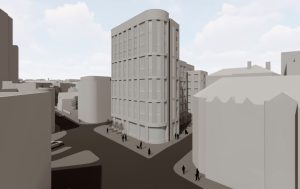Businesses ‘quaking in their boots’ over historic business rates rise

Businesses are “quaking in their boots” over a £3bn leap in business rates bills, according to property industry specialists.
The hike is likely to be the largest annual jump since 1991 following the announcement earlier today that inflation hit 10.1% in September.
The tax on all commercial properties rises in line with the inflation data for September.
Jerry Schurder, business rates policy lead at property advisor Gerald Eve said: “The last time that the Uniform Business Rates had to increase by as much as 10.1% was in 1991 when it rose by 10.9%.
“Businesses are quaking in their boots at the risk of the new Chancellor forcing up business rates in line with inflation – which would add another £3bn per annum to already unaffordable costs.
“In the last two Autumn Budgets, the then Chancellor, Rishi Sunak, froze the UBR at its current level of 49.9p per pound of each property’s Rateable Value assessment – but the loss of revenue to the Exchequer was relatively modest as inflation was running at 0.5% in September 2020 and 3.1% in 2021.
“The Prime Minister claims that her policies are designed for ‘growth, growth and growth’ but further business failures and shop closures will result unless the UBR is frozen again.”
Furthermore, says Schurder, an additional £1.7bn hit to over 250,000 businesses in the retail, leisure and hospitality sectors is on the way unless the existing 50% discount for those businesses is extended.
The recently ousted Chancellor, Kwasi Kwarteng, eschewed the opportunity in his mini-Budget to announce any business rates support.
Schurder added: “Businesses are dependent on the new Chancellor stepping up to the plate and immediately announcing a UBR freeze.
“Huge business rates hikes are not the way to grow our economy and attract inward investment.”
Peter Fullam, head of rating UK regions at JLL, said: “Today’s confirmation of CPI at 10.1% will no doubt be a concern to ratepayers across the region who are already braced for significant changes to their liabilities as a result of the upcoming 2023 Revaluation. JLL analysis into the 2023 rating revaluation has identified it as one of the most redistributive of the modern era. JLL predict that we will see a substantial shift in value for the retail and logistics sectors. We expect to see the share of tax paid by retailers to fall significantly, while industrial property – which in value terms is mostly logistics – will pay more.
“Combined with today’s inflation figures, the government has a tough call to make. It can opt to adopt the full 10.1% inflationary figure in the multiplier, or in the context of an already challenging period it could choose to intervene and fund a cap, or freeze it altogether. They will undoubtedly be aware that an inflation uptick will hit businesses of all shapes and sizes and, with the next revaluation due in less than 6 months. Without clarity on the mechanics of a transitional relief scheme, businesses currently have no real visibility on where their liability will be in order to budget correctly.
“These are turbulent times for the region, the country and our new Chancellor, who now has incredibly tough decisions to make. Yet we would urge him to intervene on rates in a meaningful way, as these have been continually frozen for the last couple of years.”








